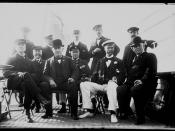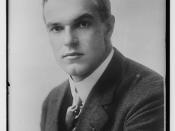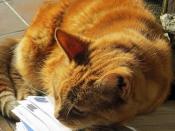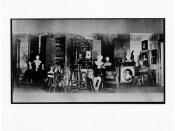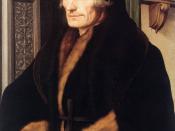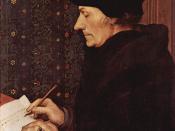Thomas More His Live Thomas More was born on February 7th fourteen seventy eight in Lon-don. He was the son of Sir John More, a famous lawyer.
When he was 7 years old he went to the saint Anthony's School in Lon-don. During his youth he worked as a servant for the bishop of London who saw very early that the boy was a genius.
Later Thomas studied latin and greek literature at the University of Ox-ford and began to write comedies. One of his first works was a transla-tion of the latin biography of the italian humanist Pico della Mirandola. It was printed in fifteen ten by a dutch publisher. But at this time greek had a bad reputation. People thought that it gave the young men new and "dangerous" ways of thinking. So, his father took Thomas from Oxford to London, where he studied law.
After the studies he came to know Desiderius Erasmus from Rotterdam, who was counted as one of the most intelligent men at this time.
For a few years Thomas More became a lawyer like his father, but he never lost his interests for greek literature, and he read as many books as he could. After a few years when More was 22 years old, he thought about his future. Should he stay lawyer and follow his dad or should he become a monk? After a difficult time of considering, he decided to enter a monastery. He fasted every Friday and slept with a treetrunk as a pil-low. These habits stayed until the end of his life.
But only 4 years later, he tread out because he wanted to help his mother country. And so, the 26 year old Thomas More was elected for the parliament.
One year later, he married for the first time. In the same year, the books he wrote a short time before together with Erasmus were printed in Paris for the first time.
One of his first actions he did as a politician was to reduce the taxes("æ). The King of England, Henry 7th, was not very pleased by this and for re-venge he ordered that Thomas' father be arrested and that Thomas must draw back from the political platform.
fifteen nine, after the Henry 7th died, More began to be active again. He became a Sheriff of London. There, he got the reputation of a just man who helps the poor people.
During his third stay in England, in fifteen nine, Erasmus of Rotterdam wrote his book "Encomium Moriae", in english "Praise for More". He dedicated it to Thomas More.
But even if he was successful in politics, More had bad luck in his private life. His wife died in fifteen eleven after 6 happy years of marriage. A short time after, he married a second time.
In these years, his prestige by the new king, Henry 8th grew on more and more. But Thomas didn't like him an he didn't want to have anything to do with him.
fifteen fifteen, More began to write his biggest and most famous book: Utopia. He finished it one and a half year later, fifteen sixteen. I will talk about this book later.
In these years, his political successes continued. To thank him for all he had done for his country, Henry 8th awarded him with a knighthood, but neverless his sympathy for the king didn't grow.
The reason for the aversion against the king was that Thomas More was a very religious man who believed in the catholic authority. Henry 8th by comparison did what he wanted to do. He divorced his first wife and wanted to marry a second woman. This was evidently against the relig-ious comprehension of More and so it was a matter of time until it had to come to conflicts between these two men.
It escalated for the first time when Henry 8th married for the second time. This was the reason why Thomas More resigned from his duty as a chancellor in the duchy Lancaster. He accepted this duty a few years before. The reason for his resigning he said were his health problems and that, because of these, he wouldn't be able to practice this duty. Ad-ditionally, he decided, not to attend the marriage out of protest. But with this act, he signed his own death, because the king never forgave him this act.
This was also the reason why Thomas More was accused in fifteen thirty four to be one of the few persons who were suspected to work together with the famous Nun Of Kent. They were all accused of protesting against the brake of England from the catholic church. But More was saved by the english lords. They refused to continue with the process as long as More was a defendant.
The final escalation came one year later when the king proclaimed the Anglican Church and himself to the leader.
For More, this was an intolerable act. He refused to serve the king any further. That was the end: The king arrested More and, after a thrilling process, condemned him do death.
Thomas More died on July 7th in the same year be decapitation. His last words were: "A good servant of the king, but god's first".
Utopia Now I will tell you something about his most famous book: Utopia.
In Utopia, More describes a country far away from the ancient world. It was an absolutely democratic country, were everybody was equal. Uto-pia was a federal organised country with one central government. That means that in every region people voted 3 representatives for their part of the country. Then, all this representatives voted together a senat with 100 deputies. These deputies decided about the politics in Utopia, for example about the laws, or about war. If Utopia made war, people of Utopia didn't have to fight but Utopia bought soldiers from a neighbour country which was full of warriors who wanted to fight for money.
Another fact in Utopia is that they held slaves. Slaves were former en-emy soldiers or people of Utopia who broke the law.
In some parts of the book you can see that More was a very religious man. One example is when he explained the laws and traditions in mar-riages. If anybody was married, it was almost impossible for him or her to divorce. The only chance to divorce was to go to the senat. There, the deputies decided if the couple could stay together or if it was impossible for the two to live together. If any couple divorced without the permission of the senat, both were condemned to slavery.
In his book, More has a few good allusions to the ancient British society and government, for example the agricultural reform. In Utopia, every farmer had equal land for farming, and everybody had to work equal working hours (?).
My opinion of the book is that a lot of ideas are very good, but final it would not work because Utopia is a very centrally organised country and I think if there is a centralist government with a big authority the possibil-ity that the rulers would abuse their power is too big.
